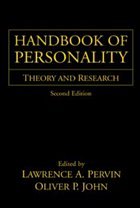Table of contents:
‘Introduction.’ ‘Winter, Barenbaum,’ History of Modern Personality Theory and Research. Part II. Theoretical Perspectives. ‘Buss,’ Human Nature and Individual Differences: The Evolution of Human Personality. ‘Westen, Gabbard,’ Psychoanalytic Approaches to Personality. ‘John, Srivastava,’ The Big Five Trait Taxonomy: History, Measurement, and Theoretical Perspectives. ‘McCrae, Costa,’ A Five-Factor Theory of Personality. ‘Bandura,’ Social Cognitive Theory of Personality. ‘Mischel, Shoda,’ Integrating Dispositions and Processing Dynamics within a Unified Theory of Personality: The Cognitive Affective Personality System. ‘Magnusson,’ Holistic Interactionism: A Perspective for Research on Personality Development. Part III. Interface with Other Fields. ‘Plomin, Caspi,’ Behavioral Genetics and Personality. ‘Pickering, Gray,’ The Neuroscience of Persoanlity. ‘Caspi, Roberts,’ Personality Continuity and Change across the Life Course. ‘Lewis,’ On the Development of Personality. ‘Widiger, Verheul, van den Brink,’ Personality and Psychopathology. ‘Baumeister,’ On the Interface between Personality and Social Psychology. ‘Cross, Markus,’ The Cultural Constitution of Personality. Part IV. Content Areas. ‘Clark, Watson,’ Temperament: A New Paradigm for Trait Psychology. ‘Kihlstrom,’ The Psychological Unconscious. ‘Robins, Norem, Cheek,’ Naturalizing the Self. ‘McAdams,’ Personal Narratives and the Life Story. ‘Little,’ Personality and Motivation: Personal Action and the Conative Evolution. ‘Gross,’ Emotion and Emotion Regulation. ‘Carver, Scheier,’ Stress, Coping, and and Self-Regulatory Processes. ‘Contrada, Cather, O'Leary,’ Personality and Health: Dispostions and Processes in Disease Susceptibility and Adaptation to Illness. ‘Weiner, Graham,’ Attribution in Personality Psychology. ‘Simonton,’ Creativity and Genius. ‘Wiggins, Trobst,’ The Fields of Interpersonal Behavior. ‘Ozer,’ Four Principles for Personality Assessment. Part V. Overview.^ N ‘Pervin,’ Epilogue: Constancy and Change in Personality Theory and Research.
The fully revised second edition of this classic text ushers the study of personality into the 21st century. New and updated chapters from foremost authorities provide a historical overview of modern persoanlity theory, bring major theoretical perspectives into focus, and report on the current state of the science in a range of key domains. Documenting the ongoing evolution of psychoanalytic, trait, social cognitive, and interactional approaches, the volume explores the dynamic interface between personality psychology and other disciplines.
In particular, the recent explosion of knowledge about biological aspects of personality is reflected in completely new chapters on evolutionary psychology, behavioral genetics, neuroscience, and temperament. Major research is also presented on such defining topics as the self; the psychological unconscious; motivational processes; emotion and emotion regulation; stress, coping, and health; interpersonal behavior; personality assessment; and more.
The fully revised second edition provides a historical overview of modern personality theory, brings major theoretical perspectives into focus, and reports on the current state of the science on a range of key domains.
‘Introduction.’ ‘Winter, Barenbaum,’ History of Modern Personality Theory and Research. Part II. Theoretical Perspectives. ‘Buss,’ Human Nature and Individual Differences: The Evolution of Human Personality. ‘Westen, Gabbard,’ Psychoanalytic Approaches to Personality. ‘John, Srivastava,’ The Big Five Trait Taxonomy: History, Measurement, and Theoretical Perspectives. ‘McCrae, Costa,’ A Five-Factor Theory of Personality. ‘Bandura,’ Social Cognitive Theory of Personality. ‘Mischel, Shoda,’ Integrating Dispositions and Processing Dynamics within a Unified Theory of Personality: The Cognitive Affective Personality System. ‘Magnusson,’ Holistic Interactionism: A Perspective for Research on Personality Development. Part III. Interface with Other Fields. ‘Plomin, Caspi,’ Behavioral Genetics and Personality. ‘Pickering, Gray,’ The Neuroscience of Persoanlity. ‘Caspi, Roberts,’ Personality Continuity and Change across the Life Course. ‘Lewis,’ On the Development of Personality. ‘Widiger, Verheul, van den Brink,’ Personality and Psychopathology. ‘Baumeister,’ On the Interface between Personality and Social Psychology. ‘Cross, Markus,’ The Cultural Constitution of Personality. Part IV. Content Areas. ‘Clark, Watson,’ Temperament: A New Paradigm for Trait Psychology. ‘Kihlstrom,’ The Psychological Unconscious. ‘Robins, Norem, Cheek,’ Naturalizing the Self. ‘McAdams,’ Personal Narratives and the Life Story. ‘Little,’ Personality and Motivation: Personal Action and the Conative Evolution. ‘Gross,’ Emotion and Emotion Regulation. ‘Carver, Scheier,’ Stress, Coping, and and Self-Regulatory Processes. ‘Contrada, Cather, O'Leary,’ Personality and Health: Dispostions and Processes in Disease Susceptibility and Adaptation to Illness. ‘Weiner, Graham,’ Attribution in Personality Psychology. ‘Simonton,’ Creativity and Genius. ‘Wiggins, Trobst,’ The Fields of Interpersonal Behavior. ‘Ozer,’ Four Principles for Personality Assessment. Part V. Overview.^ N ‘Pervin,’ Epilogue: Constancy and Change in Personality Theory and Research.
The fully revised second edition of this classic text ushers the study of personality into the 21st century. New and updated chapters from foremost authorities provide a historical overview of modern persoanlity theory, bring major theoretical perspectives into focus, and report on the current state of the science in a range of key domains. Documenting the ongoing evolution of psychoanalytic, trait, social cognitive, and interactional approaches, the volume explores the dynamic interface between personality psychology and other disciplines.
In particular, the recent explosion of knowledge about biological aspects of personality is reflected in completely new chapters on evolutionary psychology, behavioral genetics, neuroscience, and temperament. Major research is also presented on such defining topics as the self; the psychological unconscious; motivational processes; emotion and emotion regulation; stress, coping, and health; interpersonal behavior; personality assessment; and more.
The fully revised second edition provides a historical overview of modern personality theory, brings major theoretical perspectives into focus, and reports on the current state of the science on a range of key domains.

